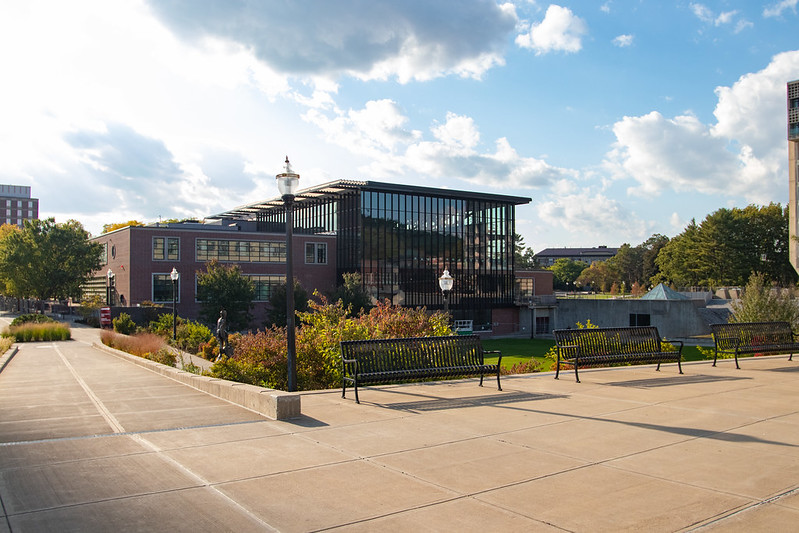
Graduate student Wanette Vargas said she has always been startled by the amount of alcohol consumed by adolescents, especially college students. She has chosen to study the biological effects of excessive alcohol consumption for her research as a doctoral student in the neuroscience and behavioral program at the University of Massachusetts.
Her findings show that the amount of alcohol consumption in early adolescence has profound negative impacts on the brain, particularly when it comes to myelin in the prefrontal cortex.
Her findings were recently published in the Oct. 29 issue of The Journal of Neuroscience, where she detailed her research process and results.
In an email to the Daily Collegian, Vargas said, “There are areas of our brains, like the prefrontal cortex, that are still developing through our twenties. This means that college students should think carefully about the potential risks of drinking alcohol, especially binge drinking. Alcohol may negatively affect brain development in humans and have long-term consequences on areas of the brain that are important for controlling impulses and making decisions.”
Vargas began studying the effect of adolescent drinking as a student at the University of Puerto Rico at Mayagüez. She dedicated her undergraduate research to studying patterns of alcohol consumption among adolescent, Hispanic minorities in the United States.
She came to UMass just over four years ago, and under the tutelage of Dr. Heather Richardson, she has been researching the biological effects of alcohol consumption.
According to a University press release, Vargas worked with Dr. Richardson, the principal investigator of the lab, Lynn Bengston and Brian Whitcomb of UMass, and Nicholas Gilpin of Louisiana State University. The researchers believe their study is the first to show voluntary alcohol consumption has negative effects on the development of adolescent brains.
The study received funding through a two-year grant from The National Institute on Alcohol Abuse and Alcoholism. The NIAAA defines binge drinking as a pattern of drinking that brings the blood alcohol level to 0.08. This occurs after four drinks for women and five for men over a period of two hours. The NIAAA reports that four out of five college students drink alcohol. Of those students, about half consume alcohol through binge drinking.
The researchers conducted a series of experiments using adolescent male rats. Each experiment looked at the effect of binge drinking on different parts of the brain. The researchers gave the rats access to sweetened alcohol – sweetened water in the control – over a period of two weeks. The rats would push a lever to access the sweetened beverage. By pressing on this lever, it shows the rats voluntarily consumed the alcohol.
The press release further explained the rats that consumed alcohol as adolescents had reduced levels of myelin – a fatty coating that wraps around neural fibers in the brain – in the prefrontal cortex when compared to the control rats. The researchers also looked at the rats after several months and found that rats exposed to alcohol in adolescence had reduced levels of myelin in adulthood.
The study shows that early experience with alcohol can physically alter brain structure. Vargas explained, “We found that alcohol damaged and reduced myelin within the frontal lobes, or more specifically, the prefrontal cortex – a brain region extremely important for high order functions such as working memory, impulse control and decision making.”
The researchers also looked at working memory, which is the ability to hold onto information for a given period. They found that the more alcohol the rats consumed in adolescence, the worse they performed on the working memory test as adults.
Vargas explained this study is part of her doctoral dissertation. She noted that the research process took a long time. She said it requires a lot of thinking, planning and trouble shooting. She also explained how Dr. Richardson provides crucial guidance throughout the process, as well as the undergraduates working in the lab with her. According to her, it truly is a team effort.
“It took us several years to complete all the experiments in order to answer our research questions. The brain processing takes quite awhile because labeling myelin is tedious and so are the many, many hours at the microscope,” she added in the email.
Vargas pointed out that it can be difficult at times, but she finds it rewarding to answer questions relating to the effects of alcohol on the brain. She is interested in understanding what makes people vulnerable to alcohol abuse disorders and the underlying mechanisms by which alcohol affects myelin and white matter.
Kathleen Kirk can be reached at [email protected].


















